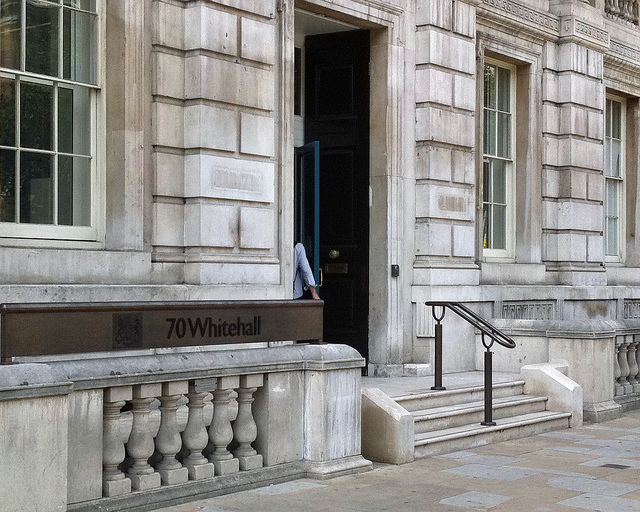Interview: Jeremy Heywood on his time in the private sector, big data, and evidence-based policymaking
Sir Jeremy Heywood is the Cabinet Secretary, and thus one of the country’s most senior civil servants, and an influential adviser to the Prime Minister. In part two of this interview with Ipsos MORI’s Chief Executive, Ben Page, he talks about his time in the private sector, the challenge presented by evidence-based policy making, and fluctuations in public opinion. Part one of the interview can be found here, and the issue of Understanding Society in which it originally appeared can be found here.
BP: You spent three years working at investment bank Morgan Stanley, returning to the civil service in mid-2007. How has that experience shaped your thinking?
It was both a shock to the system and interesting. It was a very different environment working in an American investment bank. It was personally challenging because obviously I had no reputation or knowledge in that sector. The first thing I had to do was go away and do my professional exams and it was quite tough going back to school. So that was interesting but what did it teach me? You always learn more about an organisation if you spend a bit of time outside it. It convinced me that I actually preferred working on public policy than making money for other people. So I learnt a bit about myself.
I also picked up something from the incessant drive for innovation, differentiation and creativity that you get in the best private sector organisations. Morgan Stanley was constantly competing for that new idea to convince companies, chief executives or chairmen that they had something fresh to say. That competition occasionally can spill over into something undesirable but if suitably harvested, it can provide very innovative thinking. Since coming back into the civil service, I have been quite keen to find a way of opening up parts of the civil service’s thinking to external competition. But you need to do that in a very cautious way. You do not want to throw away what the civil service uniquely brings – a lack of vested interest.
BP: Sounds like you would not be a supporter of the American model where a good proportion of the senior staff change with political regime in power?
I don’t favour that at all. I certainly benefited from my time in the private sector and we should have more people coming in for short spells and such like. But effectively to review most of the top tier every five years, or every ten years, creates major instability around any changes of government. When we moved from a long period of a Labour government to a Coalition government, the civil service provided some stability.
BP: The civil service did pretty well, I think most people would say.
The civil service did extremely well. A lot of planning went into that but most politicians would say that that worked really well for the benefit of the country. The other point about that is you would not attract the best and brightest to the civil service if they felt there was a glass ceiling above a certain point and all the top jobs would go to political appointees. Despite the fact that our pay is not the highest people choose in their droves to come and work for the civil service. That is because you can have a whole career in the civil service, potentially stretching as high as permanent secretary.
BP: Since the Coalition came to power, big data has been on the agenda. Think-tanks and political researchers believe that a big data revolution will be one of the upcoming global trends. In an age of mass information, do you think this government is equipped to employ big data analytics and use it to aid economic growth and public service improvements? Our latest Global Trends Survey shows the public do have some concerns around data privacy.
There is huge potential but we have to proceed very carefully, with complete transparency. The principle should be that people should control their own personal data. There is a difference between personal data and anonymised data, untraceable back to the individual.
BP: Ipsos MORI found recently in a survey that people said the thing that would offend them most about a large corporation – be it a supermarket or bank – was not them despoiling the third world, or them paying their bosses trillions, it was actually selling their anonymous data to somebody else.
You have to have the public’s consent on this issue. We have to proceed very carefully and steadily and I would probably say slowly too. There is more data sharing we can do and most people in the country would support that provided they knew it was happening and was properly legitimised by Parliament where necessary. For instance, people get very frustrated having to give their name and address multiple times to different government bodies.
BP: Much has also been made of evidence-based policy-making since 2010. Ipsos MORI conducted a survey for the Royal Statistical Society on public perceptions. It revealed that the British public are wildly wrong on key economic issues, allowing anecdotal evidence to influence their view of society over objective evidence. For example, out of every £100 spent on benefits, people believe that £20 is fraudulently claimed; the government estimate is 70p. To what extent is it the role of government or the civil service even, to act as neutral arbiters and actually to spend time clarifying misperceptions?
Well it is certainly important that when we put information out it is as accurate, informative and well marketed as possible. We have the Office of National Statistics and UK Statistics Authority; we have mechanisms in place when it comes to the data that is being put out. I do not think you can necessarily hold us responsible for how that data is received. We cannot compel people to read our press releases and so on. But we live in straitened times and we have had to cut our marketing budgets down. If there are areas where misperception is causing real damage to a community or to peoples’ personal health then that would be an area to prioritise for a public information campaign.
BP: My hypothesis is that there is, in both government and the private sector, a lot of data and it’s rarely condensed in a helpful way. This is from my professional viewpoint. How do we get more evidence informed policy?
We are better than people give us credit for when it comes to using evidence and using data but we need to be a lot better. There is a view out there, in some quarters, that the pace of government these days is much faster. It is definitely true that the pace of decision taking has massively accelerated in my time in government. Nevertheless, data and evidence are still very important. One of the things I am most keen to pursue as Cabinet Secretary is to raise the quality of evidence-based policymaking.
So that is partly about open policymaking and being aware for example of what front-line practitioners are doing. You have to have a better sense of what is happening in other countries and what the best think-tank thinking is. Also crucial are the What Works initiatives and the evidence centres for social policy that we have established. Dr David Halpern, Head of the Behavioural Insights Team, is leading the work for us. We are aiming for the centres to match NICE’s record of using rigorous evidence to shape decisions. The Education Endowments Foundation has been designated a What Works centre to ensure an evidence-based approach in education policy.
And we set up four or five other centres that now have the task of sifting through all the research work that’s been done, particularly academic work. The idea is to run them as control files across the world and really try to understand which particular social policy or economic policy interventions actually have an effect. This is with a view to making sure that when we advise ministers or when commissioners decide what to commission, they are not wasting government money. We have a lot less money to spend than we used to.
BP: To what extent do you think the policy advice that ministers receive before making decisions should be made public or not.
I do not think it should be at all, as much as I believe in transparency.
BP: I ask because it would be good to see the evidence that ministers were given on which they based their decision.
Our responsibility is to work privately with ministers so that ministers can make decisions and then we should collectively explain the basis on which We are better than people give us credit for when it comes to using evidence and using data but we need to be a lot better. Top advice decisions have been taken. Therefore, I am all in favour of giving the evidence and the explanations but I do not think we should be providing advice in public. If you force the civil service to give their advice in public, it will lead to less candid advice, probably more risk averse advice and less innovative advice. And it would blur accountabilities in my view.
BP: Thank you for your time.
—-
Note: this interview was originally published in Ipsos MORI’s December 2013 ‘Understanding Society’ publication, which can be found here. It represents the views of the author and not those of Democratic Audit or the LSE. Please read our Comments Policy before posting. The shortened URL for this post is: https://buff.ly/1acecMM
—
 Ben Page is Chief Executive of Ipsos MORI. He joined MORI in 1987 after graduating from Oxford University in 1986, and was one of the leaders of its first management buyout in 2000. A frequent writer and speaker on leadership and performance management, he has directed hundreds of surveys examining service delivery, customer care and communications.
Ben Page is Chief Executive of Ipsos MORI. He joined MORI in 1987 after graduating from Oxford University in 1986, and was one of the leaders of its first management buyout in 2000. A frequent writer and speaker on leadership and performance management, he has directed hundreds of surveys examining service delivery, customer care and communications.






 Democratic Audit's core funding is provided by the Joseph Rowntree Charitable Trust. Additional funding is provided by the London School of Economics.
Democratic Audit's core funding is provided by the Joseph Rowntree Charitable Trust. Additional funding is provided by the London School of Economics.
Read part 1 https://t.co/MsIUAmprma & 2 https://t.co/UIKFLTMPyJ of @benatipsosmori’s interview w/ Jeremy Heywood from ‘Understanding Society’
Part 2 of our Jeremy Heywood interview with @benatipsosmori is now online @IpsosMORI @ukcivilservice https://t.co/56Gx1J2Wcg
Interview: Jeremy Heywood on his time in the private sector, big data, and evidence-based policymaking https://t.co/HwojUAg35D